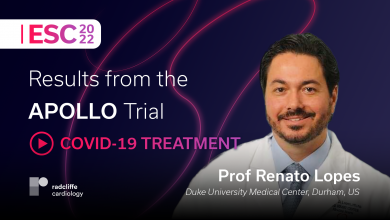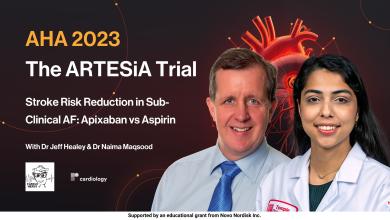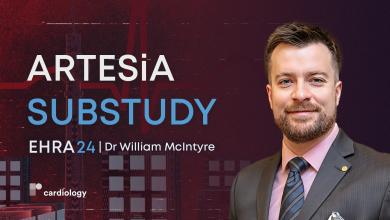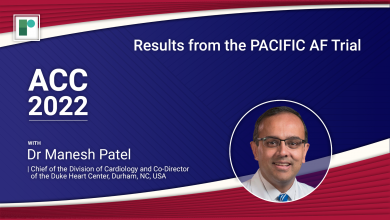Search results
Author(s):
Renato D Lopes
Added:
1 year ago
ESC Congress 22 — Prof Renato Lopes (Duke University Medical Center, US) talks about the data from the APOLLO trial (NCT04746339).
This randomized, double-blinded trial compared a DOAC, Apixaban 2.5 MG twice daily with placebo for 30 days. The trial assessed this intervention in outpatients with symptomatic SARS-CoV2 infection and risk factors for thrombosis. The primary outcome measure focused…
View more
Author(s):
Naima Maqsood
,
Jeff Healey
Added:
4 months ago
AHA 2023 — Dr Naima Maqsood, CardioNerds ambassador (Temple University Hospital, US) interviews investigator, Dr Jeff Healey (McMaster University, CA) to outline the findings from a phase 4 trial of apixaban to reduce thromboembolism in patients with subclinical atrial fibrillation (AF).ARTESiA (NCT01938248) aims to determine if apixaban in combination with aspirin can reduce the instance of…
View more
Author(s):
Raffaele De Caterina
Added:
3 years ago
Atrial fibrillation (AF) is the most common sustained cardiac arrhythmia1 and increases the risk of stroke and thromboembolism, on average, fivefold.2 Strokes in AF are generally more severe and associated with greater mortality and disability than strokes from other causes.3 Prevention of stroke and thromboembolism is therefore an important part of AF management. Guidelines have, until now,…
View more
Author(s):
Han Naung Tun
,
May Thu Kyaw
,
Erik Rafflenbeul
,
et al
Added:
1 year ago
Author(s):
William McIntyre
Added:
1 week ago
EHRA 24 - Investigator, Dr William McIntyre (Population Health Research Institute, CA) joins us to discuss the findings from a substudy of ARTESiA (NCT01938248).ARTESiA was a randomized, parallel assignment clinical trial which aimed to assess if apixaban could reduce the risk of ischemic stroke and systemic embolism in patients with subclinical atrial fibrillation (AF) and additional risk…
View more
Author(s):
Manesh R Patel
Added:
2 years ago
In this short interview from our coverage of ACC.22 late-breaking trials, Dr Manesh Patel (Duke Heart Center, US) discusses the multicentre, randomised, double-blind PACIFIC-AF trial (Bayer)(NCT04218266).
The trial sought to determine the efficacy of the oral FXIa inhibitor asundexian and evaluate the safety of the drug, compared to the non-vitamin K oral anticoagulant (NOAC) apixaban, in…
View more
Author(s):
Julia Sikorska
,
James Uprichard
Added:
3 years ago
For more than 50 years, oral vitamin K antagonists (VKAs) were the choice of anticoagulant for the long-term treatment and prevention of arterial and venous thromboembolic events (VTE). VKA treatment is safe and effective, if a high time in therapeutic range is achieved. However, achieving a stable, therapeutic international normalised ratio can prove challenging in the context of drug and food…
View more
Author(s):
Antoni Martínez-Rubio
,
Gheorghe-Andrei Dan
Added:
3 years ago
Are low doses of direct-acting oral anticoagulants justified and appropriate in patients with nonvalvular atrial fibrillation?
The novel direct-acting oral anticoagulants (NOACs) apixaban, dabigatran, edoxaban and rivaroxaban overcome most drawbacks of vitamin K antagonists and have proven efficacious and safe in well-designed multicentre randomised clinical trials.1–4 Furthermore, the…
View more
Author(s):
Minh That Ton
,
Tri Huynh Quang Ho
,
Viet Lan Nguyen
,
et al
Added:
4 months ago
Author(s):
Ana Pardo Sanz
,
Jose Luis Zamorano
Added:
3 years ago
Search Strategy
An independent literature search was performed on the topic ‘AF in cancer patients’ with the assistance of professional librarians. The search terms included anticoagulation, cancer, cardioncology, vitamin K antagonist, direct oral anticoagulants, bleeding risk and embolic risk. An electronic search was conducted using a minimum of two major databases (Cochrane Registry, MEDLINE)…
View more
















